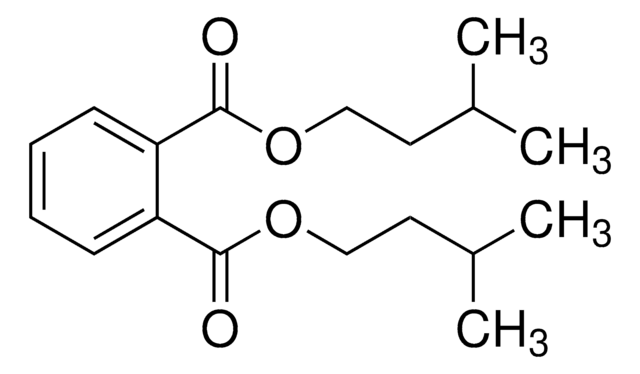49617
Dihexyl phthalate
analytical standard
Sinónimos:
1,2-Benzenedicarboxylic acid 1,2-dihexyl ester, Di-n-hexyl phthalate, Phthalic acid dihexyl ester
About This Item
Productos recomendados
grade
analytical standard
Quality Level
assay
≥99.0% (GC)
shelf life
limited shelf life, expiry date on the label
technique(s)
HPLC: suitable
gas chromatography (GC): suitable
refractive index
n20/D 1.486-1.489
application(s)
cleaning products
cosmetics
environmental
food and beverages
personal care
format
neat
storage temp.
2-8°C
SMILES string
O=C(OCCCCCC)C1=CC=CC=C1C(OCCCCCC)=O
InChI
1S/C20H30O4/c1-3-5-7-11-15-23-19(21)17-13-9-10-14-18(17)20(22)24-16-12-8-6-4-2/h9-10,13-14H,3-8,11-12,15-16H2,1-2H3
InChI key
KCXZNSGUUQJJTR-UHFFFAOYSA-N
General description
Application
Recommended products
signalword
Danger
hcodes
Hazard Classifications
Repr. 1B
Storage Class
6.1C - Combustible acute toxic Cat.3 / toxic compounds or compounds which causing chronic effects
wgk_germany
WGK 3
flash_point_f
350.6 °F
flash_point_c
177 °C
Elija entre una de las versiones más recientes:
¿Ya tiene este producto?
Encuentre la documentación para los productos que ha comprado recientemente en la Biblioteca de documentos.
Los clientes también vieron
Nuestro equipo de científicos tiene experiencia en todas las áreas de investigación: Ciencias de la vida, Ciencia de los materiales, Síntesis química, Cromatografía, Analítica y muchas otras.
Póngase en contacto con el Servicio técnico










